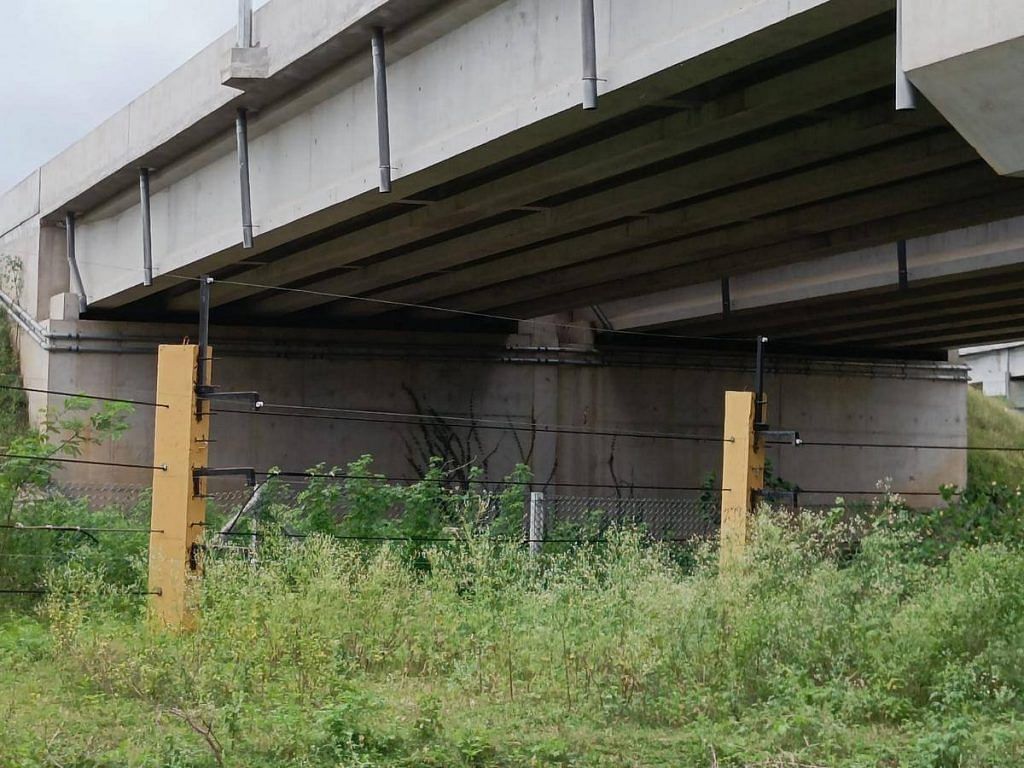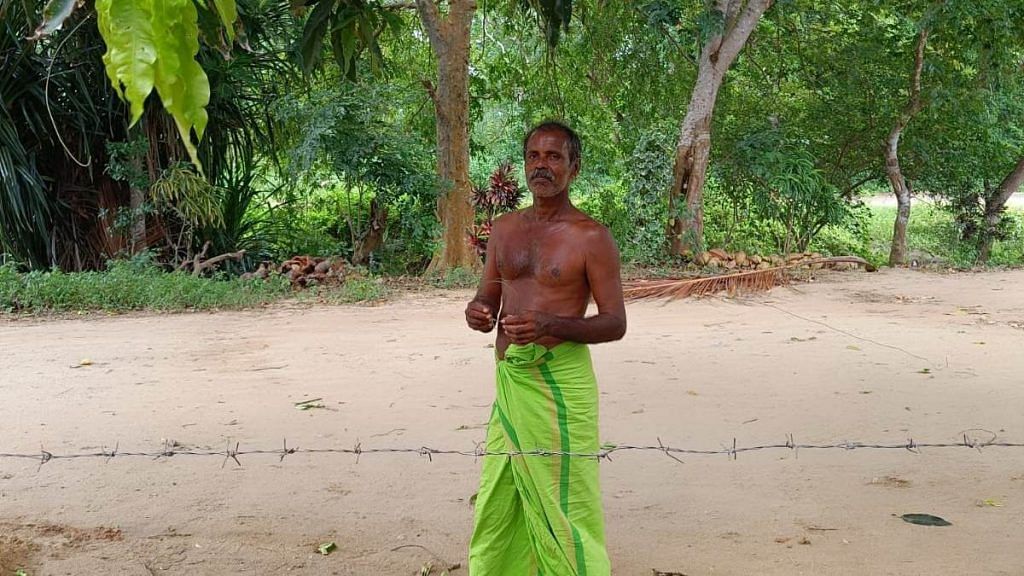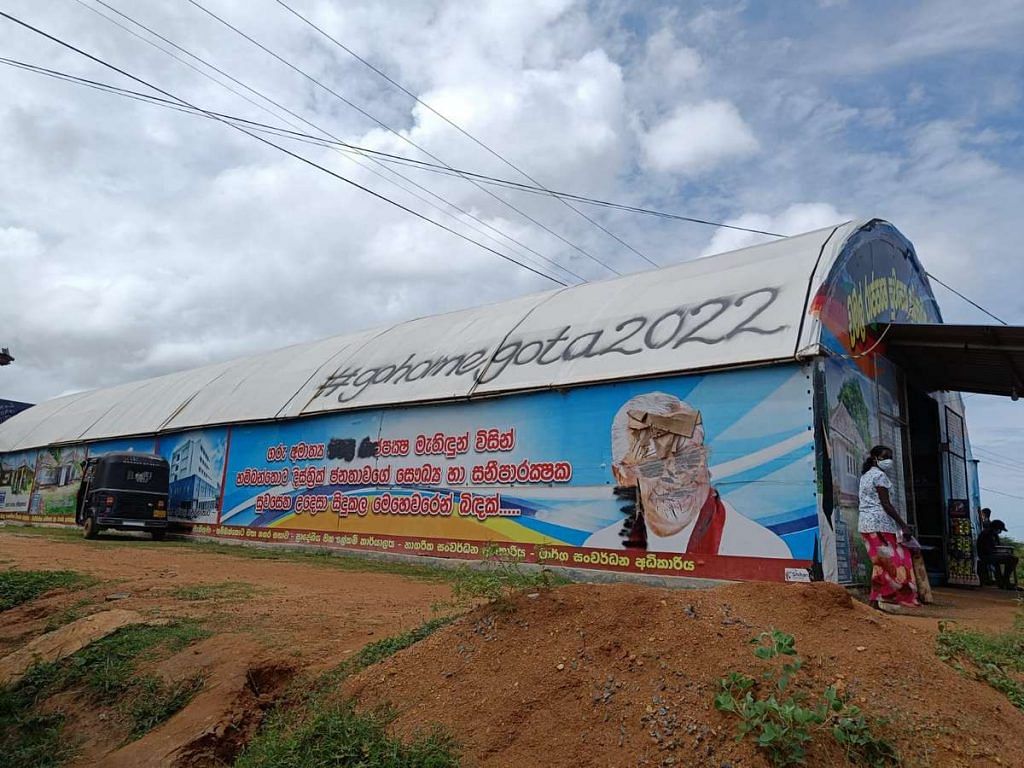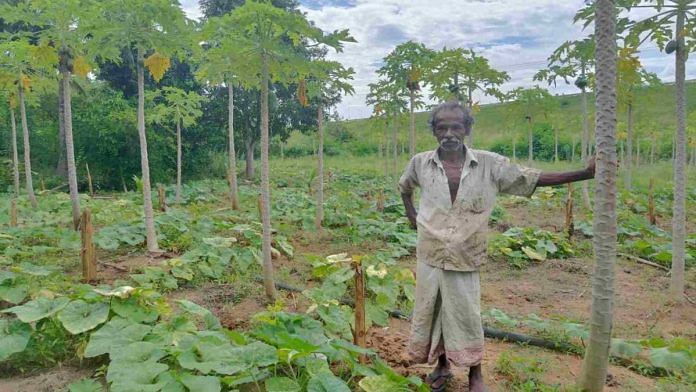Hambantota (Sri Lanka): The chicken manure that 70-year-old Sri Lankan farmer W. Premasiri uses on his pumpkins “is no good”. “Nothing came of it,” he said, putting his hand into a sack and retrieving a coconut shell worth of manure, to show The Print.
“After this switch to organic fertilisers, my paddy yield has reduced by 50 per cent, I get no good pumpkin or papaya. I am able to harvest some bananas, but the fruit is very small.”
At Swodagama village, where Premasiri and his family live, the farmers have started using whatever they can find to keep their crops healthy. Some use cow dung, which they get for free from long-time neighbours or friends in the area, while others try to get their hands on chemical fertilisers. The latter is neither easy nor cheap.
A year ago, in a dramatic announcement, President Gotabaya Rajapaksa banned the import of chemical fertilisers and pesticides, citing health concerns. Today, what was then an overnight policy switch to ‘organic farming’ is playing out in different ways on the ground.
The import ban was partially rolled back last November after protests from farmers, but shortages persist and a black market has taken shape.
Premasiri showed The Print a pack of “nitrogen booster”, made in China, costing RMB60 (about Rs 600), which he uses on his crops. He also spoke of an “oil” that has made its way from India and is sold under the counter.
“The ‘oil’ doesn’t do anything, not even a flower sprouts from using it,” he said. He now stores his chicken manure in sacks that used to hold sodium sulphate, which was previously imported from China.
Another farmer, A.G. Dharmasiri, from a neighbouring village called Walsapugala, speculated that the ‘oil’, which is sold in a green bottle branded ‘Agri Sift’ and with a “manufactured-in-Gujarat” label, makes its way by boat from India and is sold without any checks on quality or standards.
“It is because of the scarcity that these kinds of ‘oils’ are brought in. I am wary about using it since someone I know lost his crops from using it,” he said.
In India, a litre of Agri Sift — which is used to control weeds and sedges in rice cultivation — is sold for Rs 290. The bottle that Dharmasiri owned said Rs 750 on the label for which he paid LKR 11,500 (Rs 2,400). “We are using just about anything and hoping for the best,” he said.
Both Swodagama and Walsapugala are part of the Rajapaksas’ home district of Hambantota. The landscape just across from these villages is defined by high-voltage electric fences that safeguard infrastructure projects — highways and a large solar farm — sanctioned during former prime minister Mahinda Rajapaksa’s first term.

Many other garish infrastructure projects, mostly backed by the Chinese, are scattered across the district, including the Hambantota port, the Mattala airport, an international convention centre, and a cricket stadium. As one Agence France-Presse report put it, many of these projects today stand as “neglected monuments to government extravagance”.
Government-sanctioned infra projects have also contributed to farmers’ loss of livelihoods. Because such initiatives have eaten into the natural habitat of elephants in Hambantota, there has been an increase in human-animal conflict.
The farmers here, therefore, must not only contend with the fallout of the hasty switch to ‘organic’ farming, but also deal with elephants ravaging their fields and destroying their homes.
Also Read: How Indian trawlers & economic crisis create a perfect storm for Sri Lanka’s Tamil fishermen
Failed protests, farmers not planting, food security in peril
In early 2021, close to 80 farmer groups in the district agitated for weeks, holding up black flags and demanding that the government clearly demarcate a Wildlife Management Reserve in the area. The scene today is quieter, filled with a resignation that protests don’t bring much change.
“Many politicians came to visit and assured us help but nothing came of it,” Dharmasiri told ThePrint. He was fixing barbed wire around his house, running alongside a battery-powered electric fence, to keep the elephants out.
“It is futile to protest here. The elephant problem was not solved, and it is not going to be very useful to protest for other concerns,” he said.

Nimal Shantha, who lives next door to Premasiri’s plot of land, also took part in the protests. He told ThePrint that elephants had destroyed his home on three different occasions. The bricks on the walls of his house are still exposed since he hasn’t gotten around to painting yet.
“I had taken a loan to cultivate bananas, but the elephants destroyed the farm and ate all my produce,” he said. “Now, my father and I work on somebody else’s farm to grow some rice and vegetables, which we subsist on. We don’t have money to buy diesel to run a tractor to cultivate paddy for sale.”
Many farmers in the region have now decided not to cultivate crops in the shorter May-August Yala farming season, including Mahinda Samarawickrama, the head of a farming committee here. However, this is not an option for Shantha. “I understand their reasons not to but if I don’t work and produce anything, I won’t be able to feed the family.”
In April 2022, the Academics’ Movement to Safeguard Agriculture (AMSA), a concerned group of academics, held a press conference to mark the anniversary of the ban on chemical fertilisers and how it had threatened food security in Sri Lanka.
In a statement a month later, they noted: “We are at a crucial stage of the Yala season of 2022 where crop establishment is severely constrained by shortages of fuel, fertiliser, and other essential inputs.
“The current crisis has brought to a standstill almost all activities in the value chain of production, processing, transport, and marketing of agricultural produce. These include food for the local population and export-oriented products which bring-in valuable foreign exchange.”
The AMSA also pointed out that the failure of the current Yala season would “not only create substantial and widespread shortages of essential food items (rice, pulses, vegetables, fruits, eggs, meat, etc), but also cause a shortage of seed paddy for the next Maha season of 2022/2023”.
This could be devastating, the statement said: “[T]he Maha season produces two-thirds of the national paddy production, potential impacts of its failure on the national food security and social stability are wide-ranging and severe.”
‘This is a manmade disaster’
Professor Gamini Senanayake, chairperson of the Sri Lankan Council for Agricultural Research Policy, said that organic agriculture in principle is a good initiative, but it has been implemented the wrong way, leading to disastrous outcomes.
“The government insisted on going for 100 per cent organic in a very short time. It is wrong — you can’t convert each and every sector of agriculture into organic. Certain sectors need chemical inputs, like floriculture and certain high-end crops,” he told ThePrint.
“We are in a situation today where we can’t go for subsidies like we have since independence. Fuel, fertiliser costs have all gone up,” he added.
Senanayake has solutions to the problem in mind, but fears that, without political stability, they may never be implemented.
“I have proposed an integrated plant nutrient system that will combine chemical and organic fertilisers, and also help the environment and soil health. The thing is, who is going to give advice and who is listening? With whom should we discuss these issues — the minister today is not the minister tomorrow.”

Professor Jeevika Weerahewa, an agricultural economist at the University of Peradeniya Faculty of Agriculture, noted that, according to the latest estimates, paddy yields for the 2021-22 Maha season dipped by 50 per cent and those of maize by 70 per cent.
“We are seeing a huge drop in harvest in the Maha season and have started importing rice and maize. Even if we stopped importing fertilisers, we have started importing rice and maize,” she said.
According to Weerahewa, there is no “huge scarcity issue” at this stage because of imports, but the huge increase in food prices, due to a drop in local production and rising import costs, is a serious problem.
“We are having to face huge food inflation. Food prices have gone up by 46 per cent and there will be serious repercussions on the poor and the vulnerable,” she said, adding that many people would have no choice but to sacrifice a nutritious diet in favour of energy-dense foods.
“We are in a bad shape, we should have avoided this situation. This is a manmade disaster,” she said.
Back in Swodagama, Shantha recalled the night when he, his wife, and children cowered in the middle of their house in fear that the single bull elephant outside would break down their walls and hurt them.
“The elephant went to the back of the house, dragged the large sack of rice, and made away with it,” he said. “We were left with broken walls and no rice.”
(With inputs from Nethmi Rajawasam)
(Edited by Asavari Singh)
Also Read: In besieged Lanka, war-hit Tamils miss something more precious than petrol: kids & spouses



